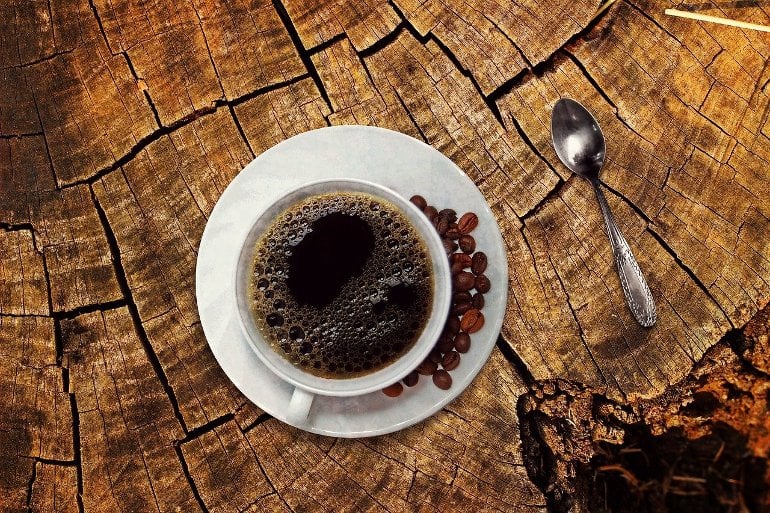Summary: A taste for black coffee and dark chocolate is possibly a genetic trait, a new study reports. Coffee drinkers who have a genetic variant that reflects faster caffeine metabolism prefer bitter, black coffee. The same genetic variant is found in those who prefer dark chocolate.
Source: Northwestern University
People who like to drink their coffee black also prefer dark chocolate, a new Northwestern Medicine study found. The reason is in their genes.
Northwestern scientists have found coffee drinkers who have a genetic variant that reflects a faster metabolism of caffeine prefer bitter, black coffee. And the same genetic variant is found in people who prefer the more bitter dark chocolate over the more mellow milk chocolate.
The reason is not because they love the taste, but rather because they associate the bitter flavor with the boost in mental alertness they expect from caffeine.
“That is interesting because these gene variants are related to faster metabolism of caffeine and are not related to taste,” said lead study author Marilyn Cornelis, associate professor of preventive medicine in nutrition. “These individuals metabolize caffeine faster, so the stimulating effects wear off faster as well. So, they need to drink more.”
“Our interpretation is these people equate caffeine’s natural bitterness with a psycho-stimulation effect,” Cornelis said. “They learn to associate bitterness with caffeine and the boost they feel. We are seeing a learned effect. When they think of caffeine, they think of a bitter taste, so they enjoy dark coffee and, likewise, dark chocolate.”
The paper was published Dec. 13 in Scientific Reports.
The dark chocolate connection also may be related to the fact that dark chocolate contains a small amount of caffeine but predominantly theobromine, a caffeine-related compound, also a psychostimulant.
Why does this matter?
Coffee and dark chocolate consumption have been shown to lower the risk of certain diseases. Moderate coffee consumption lowers the risk of Parkinson’s disease, cardiovascular diseases, type 2 diabetes and several types of cancer. Dark chocolate appears to lower the risk of heart disease.
Currently, when scientists study the health benefits of coffee and dark chocolate, they must rely on epidemiological studies, which only confer an association with health benefits rather than a stronger causal link.
Cornelis’s new research shows these genetic variants can be used more precisely to study the relationship between coffee and health benefits. Previously, scientists were using the genetic markers for coffee drinkers in general. The new findings suggest they are stronger markers for particular types of coffee drinkers—black coffee drinkers. This impacts the interpretation of these genetic studies of coffee and health.

“Drinking black coffee versus coffee with cream and sugar is very different for your health,” Cornelis said. “The person who wants black coffee is different from a person who wants coffee with cream and sugar. Based on our findings, the person who drinks black coffee also prefers other bitter foods like dark chocolate. So, we are drilling down into a more precise way to measure the actual health benefits of this beverage and other food.”
The benefits of black coffee are based on moderate consumption of two to three cups a day, Cornelis said.
The current study used genetic, dietary and food preference data available from the UK Biobank and two U.S. cohorts, the Nurses’ Health Study and Health Professionals Follow-up study.
The paper is titled “Genetic determinants of liking and intake of coffee and other bitter foods and beverages.”
About this genetics research news
Author: Marla Paul
Source: Northwestern University
Contact: Marla Paul – Northwestern University
Image: The image is in the public domain
Original Research: Open access.
“Genetic determinants of liking and intake of coffee and other bitter foods and beverages” by Marilyn C. Cornelis et al. Scientific Reports
Abstract
Genetic determinants of liking and intake of coffee and other bitter foods and beverages
Coffee is a widely consumed beverage that is naturally bitter and contains caffeine. Genome-wide association studies (GWAS) of coffee drinking have identified genetic variants involved in caffeine-related pathways but not in taste perception.
The taste of coffee can be altered by addition of milk/sweetener, which has not been accounted for in GWAS. Using UK and US cohorts, we test the hypotheses that genetic variants related to taste are more strongly associated with consumption of black coffee than with consumption of coffee with milk or sweetener and that genetic variants related to caffeine pathways are not differentially associated with the type of coffee consumed independent of caffeine content.
Contrary to our hypotheses, genetically inferred caffeine sensitivity was more strongly associated with coffee taste preferences than with genetically inferred bitter taste perception. These findings extended to tea and dark chocolate.
Taste preferences and physiological caffeine effects intertwine in a way that is difficult to distinguish for individuals which may represent conditioned taste preferences.







